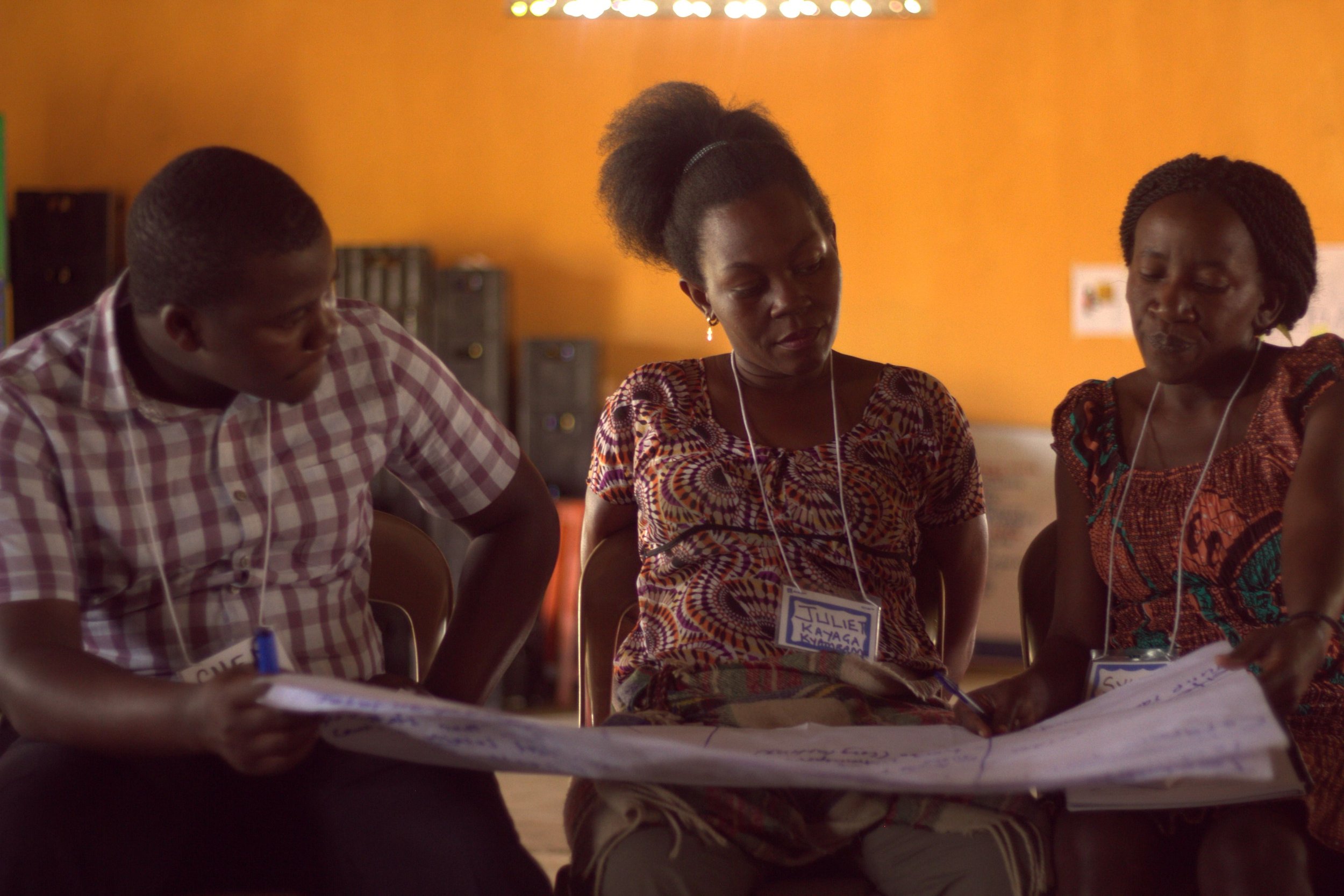Water: a women's issue
Sylvia Namukasa (right) is one of many Ugandan women working to bring increased water and sanitation access to her local community.
It all comes back to the community
Sylvia sits down at a small table outside on a clear-sky evening in Kirinda, the small Ugandan village where she was once a little girl. It's been many years since her parents extricated her from this village and moved her family into the city where they felt there were more opportunities. Now an adult, armed with a degree in Environmental Management, Sylvia is back. Talking via Zoom, set against a backdrop of small huts roofed with thatched vegetation, she leans into the camera and explains why she returned from the city to her birthplace.
"In 10 years we want to see a community that is free from any water-related and [water] borne disease," Sylvia says. "If the work spreads in Uganda, we want to see reduced cases the same, country-wide."
Women like Sylvia are tackling huge challenges
Sylvia Namukasa is the founder and executive director of Kyempapu (pronounced Chim-pop-ooh), a grassroots organization committed to community development. Even with the knowledge and training acquired through CAWST programs, she has her work cut out for her.
Today, one in four people – two billion people – around the world lack safe drinking water, according to the United Nations and UNICEF.
Almost half of the global population – 3.6 billion people – lack safe sanitation.
Women and girls around the world spend 200 million hours per day collecting water. That's time not spent in school, caring for loved ones, or earning an income.
Fewer than 50 countries have laws or policies referencing women’s participation for rural sanitation or water resources management.
Women and girls are responsible for water collection in 80 percent of households without internal water access.
Almost half of the schools in the world do not have handwashing facilities with soap and water.
Without school sanitation facilities, menstrual hygiene is nearly impossible, causing poor school attendance and completion rates for girls.
There are additional risks for mothers and caregivers
Every day, over 700 children under age five die from diarrhea linked to unsafe water, sanitation and poor hygiene.
Under-fives living in countries experiencing protracted armed conflict are 20 times more likely to die from causes linked to unsafe water and sanitation than from direct violence.
One million deaths each year are associated with unclean births. Infections account for 26 percent of neonatal deaths and 11 percent of maternal mortality.
Water access affects learning and life-opportunity
Sylvia is well aware of the statistics, grim facts that are often visible in day-to-day life. "With girls, we realized that when they also walk long distances to fetch water, some of them are raped and forced to drop out of school," she says. School hygiene is another pressing issue. “When these girls don’t have water, then they have issues during their menstrual hygiene days and they miss out on school. In the end, we have school dropouts.”
Sylvia is proactive but it's more challenging these days
"Before [COVID-19] we would always visit schools and had a schedule for visiting schools, she says. "We keep on talking to girls in schools and with female teachers on the importance of having water and the importance of hygiene. When you talk about menstrual hygiene then automatically you have to talk about water."
Back in Canada, Shauna Curry, knows the importance of water, sanitation and hygiene (WASH)
"For CAWST, water, sanitation and hygiene [WASH] is a women's issue," says Shauna Curry.
"And while we might think this is primarily because of the burden many women and girls face collecting water, that is only part of it. Gender equality and WASH are closely linked."
Shauna is CEO of the Center for Affordable Water and Sanitation Technology (CAWST) in Calgary, Alberta. She began her career as a Global Advisor at CAWST, one of the Canadian charity's professionals who work in more-than 80 countries, bringing consultation and training to help end water and sanitation shortages. Shauna has met many women like Sylvia, who are dedicated to finding solutions that best fit their own unique community and will last for generations.
Water and sanitation consultation/training elevates women
"One of my favourite stories to demonstrate how water is an empowerment opportunity for women is that of six women in Haiti who learned that it was the contaminated water that caused illness and death amongst their children," Shauna says.
She recalls how the Haitian women had learned about the biosand filter, CAWST's innovative repurposing of 200-year old technology that eliminates deadly pathogens, and sought out training on how to build one. They first built six biosand filters for their immediate families and soon had constructed filters for another 270.
"These women had no formal education and the filters that they built are among the best that we've seen anywhere in the world," Shauna says. "The actions of these six women changed the lives of many."
Healthier women and healthier families is just the beginning
Millions of women are trapped in a cycle of poverty, which is impossible to break without water, sanitation and hygiene. Back in Uganda, Sylvia Namukasa has seen that not only do these elements make school, which gives girls the tools they need to grow up and be able to earn incomes possible, they create health outcomes that bring further opportunities. She recalls an example from her own community, where improved water quality had dramatically lowered health care costs.
“One mother told me ‘I could not think of starting my small business,’” Sylvia says. “Just a small business with maybe $50USD. But the mother said ‘with the money I’m saving on medication for my five children, I’m able to start up this small business that is fetching me profits and I reinvest them back into family expenses.’”
The future of women is tied to water
Sylvia's anecdote speaks to a movement Shauna is dedicated to advancing across the globe.
"In my experience, when we train women in low-and middle-income countries, they go on to be water and sanitation technicians and leaders,” says Shauna. "Women earn incomes, become role models and share their knowledge. They spark movements and serve their communities with water and sanitation, a basic human right and foundation for development and poverty reduction."
We encourage using these times to engage others and learn more here:
Subscribe to Global Notebook, CAWST’s e-newsletter series of exclusive dispatches from our Global Advisors, sent in real-time as we work with people like Sylvia.
Start a participatory conversation on gender using CAWST’s Gender Roles Activity.

